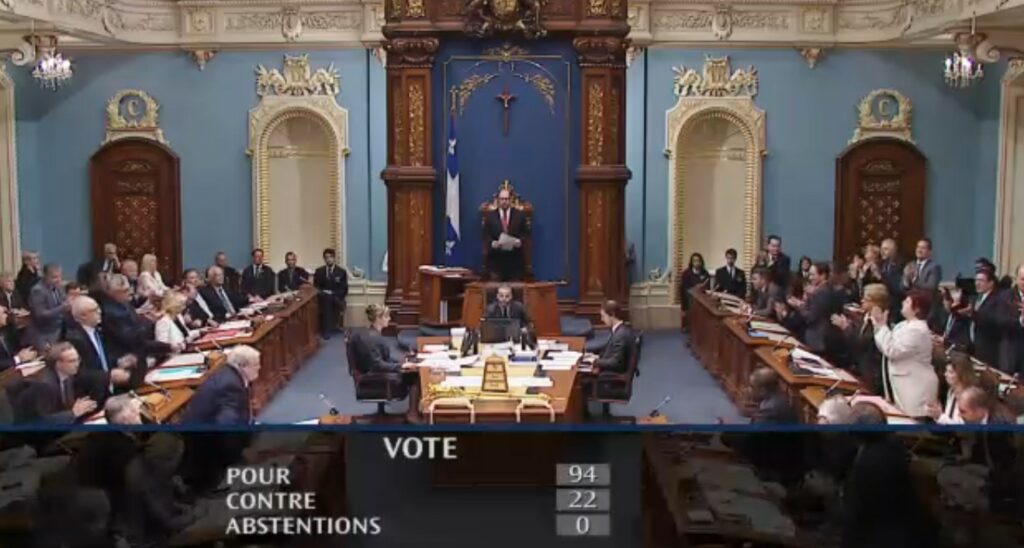Montreal, June 5, 2024 – On June 5, 2014, Bill 52 was adopted in Quebec’s National Assembly as an Act respecting end-of-life care. Let’s recall the results of the vote: 94 votes in favour, 22 against.
Ten years later, Quebec is the place in the world where recourse to medical aid in dying (MAiD, known as euthanasia outside Canada) is the most frequent.
Last March, the ministère de la Santé et des Services sociaux (MSSS), the Fonds de recherche du Québec – Société et culture (FRQSC) and the Fonds de recherche du Québec – Santé (FRQS) commissioned a research group to gain a better understanding of the use of MAiD in the Quebec context. Today, the Living with Dignity citizen network proposes 10 questions to explore aspects of the impact of this law that are often little known:
1) Why is Quebec still the only place in the world where MAiD is considered a form of care?
2) Why are Quebec and Canada seen as examples of what not to do, in countries considering legislation that could open the door to a form of assisted dying, euthanasia or assisted suicide?
3) The data on the 15,997 MAiD administrations (between 10 December 2015 and 31 March 2023) compiled by the Commission sur les soins de fin de vie (Quebec’s End-of-Life Care Commission) are obtained through self-declarations by MAiD providers. Bearing in mind that any deviation from the Act’s criteria can lead to criminal prosecution or disciplinary action, can data obtained by self-declaration really be used to assert that there has been no unintended broadening of access since 2014?
4) After advance requests for MAiD for persons incapable of decision-making (living with neurocognitive disorders), which are expected to be implemented by June 2025 in Quebec, what broader access to MAiD will be envisaged in the future? Mature minors? People living with a mental disorder (access expected in March 2027 in Canada)? Tiredness of life?
5) Why claim that MAiD by advance requests (AR) will not be possible in cases of ‘happy dementia’ when the expert physician invited to the parliamentary commission by the Quebec government to clarify this point stated in April 2023 that the wishes expressed by the patient in his or her AR must be respected (psychological suffering caused by incontinence, not recognising loved ones, etc.) regardless of whether he or she is currently suffering?
6) Why has Quebec become the only place in the world where all hospitals and palliative care homes are obliged to offer MAiD, without exception, regardless of the wishes of patients who prefer to live out their final days in an environment where death is never induced?
7) For many people (caregivers, patients, families and loved ones) in Quebec and elsewhere, MAiD/euthanasia is seen as a positive experience. According to Professor Theo Boer, former member of the euthanasia review committee in the Netherlands, one person’s freedom can become another person’s constraint. Since 2014, how many Quebecers’ choice of MAID has not been truly free because they lacked support, care or appropriate services?
8) Why caricature MAiD critics by associating them with the religious right, when citizens from all political horizons, believers, agnostics and atheists are questioning MAiD and the extension of access to it with philosophical, medical and ethical arguments?
9) The Act respecting end-of-life care also includes the right to receive palliative care. Why is it that Quebecers’ access to quality palliative care at the time and in the setting of their choice sometimes depends on their postal code?
10) Why, 10 years after the adoption of the Act respecting end-of-lifecare, is it easier to access aid in dying than aid in living?
Gratitude expressed to the 22 MPs who voted against the Act on June 5, 2014
On this tenth anniversary of the Act respecting end-of-life care, the Living with Dignity citizen network would like to thank the 22 Liberal MPs who opposed the law for its openness to MAiD in Quebec. The questions they asked 10 years ago are still very relevant today. Thank you to Ms Lise Thériault (Anjou-Louis-Riel), Mr Pierre Paradis (Brome-Missisquoi), Mr Sam Hamad (Louis-Hébert), Mr Robert Dutil (Beauce-Sud), Mr Pierre Moreau (Châteauguay), Mr Robert Poëti (Marguerite-Bourgeoys), Mr Jean D’Amour (Rivière-du-Loup-Témiscouata), Mr Laurent Lessard (Lotbinière-Frontenac), Mr Pierre Arcand (Mont-Royal), Ms Kathleen Weil (Notre-Dame-de-Grâce), Mr Stéphane Billette (Huntingdon), Ms Christine St-Pierre (Acadie), Mr Norbert Morin (Côte-du-Sud), Mr Guy Ouellette (Chomedey), Ms Lucie Charlebois (Soulanges), Ms Nicole Ménard (Laporte), Mr Gerry Sklavounos (Laurier-Dorion), Mr Raymond Bernier (Montmorency), Ms Filomena Rotiroti (Jeanne-Mance-Viger), Mr Richard Merlini (La Prairie), Ms Marie-Claude Nichols (Vaudreuil) and Mr Saul Polo (Laval-des-Rapides).
– 30 –
For interviews :
Jasmin Lemieux-Lefebvre
Coordinator
Living with Dignity citizen network
info@vivredignite.org
JUN
2024

